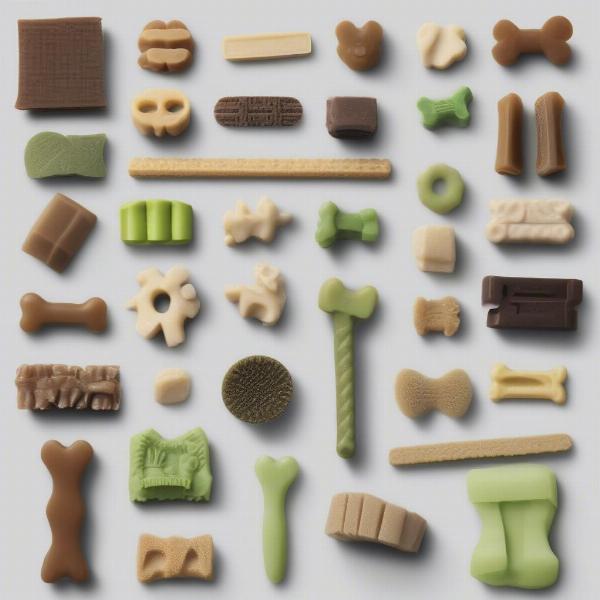Whimzees are a popular dog chew, but are whimzees good for dogs? This comprehensive guide will explore the benefits and drawbacks of Whimzees, helping you decide if they’re the right choice for your furry friend. We’ll cover everything from ingredients and dental health benefits to potential risks and alternatives, so you can make an informed decision about your dog’s dental care.
Understanding Whimzees: Ingredients and Benefits
Whimzees are all-natural, vegetable-based chews designed to promote dental health in dogs. They are typically made from a combination of potato starch, cellulose fiber, glycerin, lecithin, and various natural flavorings like malt extract and alfalfa. These ingredients offer several potential benefits:
- Dental Health: The chewy texture of Whimzees helps scrape away plaque and tartar buildup, contributing to cleaner teeth and fresher breath. Their unique shapes also help reach those hard-to-reach areas in your dog’s mouth.
- Digestive Health: The fiber content in Whimzees can support healthy digestion by promoting regular bowel movements and preventing constipation.
- Low in Calories: Compared to many other dog treats, Whimzees are relatively low in calories, making them a healthier option for dogs prone to weight gain.
- Hypoallergenic: Whimzees are often a good choice for dogs with allergies or sensitivities, as they are free from common allergens like grains, gluten, and meat.
Are Whimzees Safe for All Dogs? Potential Risks and Considerations
While generally considered safe, Whimzees are not without potential drawbacks. It’s important to consider these factors before giving them to your dog:
- Digestibility: Some dogs, especially those with sensitive stomachs, may experience digestive upset like diarrhea or vomiting after consuming Whimzees. Start with a small piece and monitor your dog’s reaction.
- Choking Hazard: Always choose the appropriate size Whimzee for your dog’s breed and size to prevent choking. Supervise your dog while they are chewing.
- Potential for Blockages: While rare, large pieces of undigested Whimzees could potentially cause intestinal blockages, especially in smaller dogs.
- Not a Substitute for Brushing: While Whimzees can help improve dental health, they are not a replacement for regular brushing. Brushing remains the most effective way to remove plaque and tartar.
Choosing the Right Whimzee: Sizes and Shapes
Whimzees come in various sizes and shapes, each designed for different dog breeds and chewing habits. Choose the size appropriate for your dog to minimize the risk of choking or blockages.
- Small Breeds: Opt for the smallest sizes, such as XS or S.
- Medium Breeds: Choose medium-sized Whimzees, like M or L.
- Large Breeds: Select the largest sizes, XL or even giant sizes, depending on your dog’s chewing strength.
Whimzees vs. Other Dental Chews: Making the Best Choice
Whimzees are just one of many dental chews available on the market. How do they compare to other options? Consider these factors:
- Ingredients: Look for natural, easily digestible ingredients. Avoid artificial colors, flavors, and preservatives.
- Chewability: The chew should be firm enough to clean teeth but not so hard that it could damage your dog’s teeth or gums.
- Calorie Content: Choose lower-calorie options, especially if your dog is overweight or inactive.
- Your Dog’s Preferences: Every dog has different preferences. Experiment with different brands and flavors to find what your dog enjoys.
 Different dog dental chews comparison
Different dog dental chews comparison
Conclusion: Are Whimzees a Good Choice for Your Dog?
Whimzees can be a healthy and effective addition to your dog’s dental care routine, offering benefits for both dental and digestive health. However, it’s crucial to choose the right size, monitor your dog while they chew, and remember that Whimzees are not a substitute for regular brushing. dog treats whimzees can be a valuable tool in maintaining your dog’s oral hygiene, but always prioritize safety and consult with your veterinarian if you have any concerns.
FAQ:
- How often should I give my dog a Whimzee? One Whimzee per day is generally sufficient for most dogs.
- Can puppies have Whimzees? Yes, but choose the smallest size appropriate for their age and chewing ability.
- What should I do if my dog experiences digestive upset after eating a Whimzee? Discontinue use and consult your veterinarian.
- Are Whimzees good for dogs with sensitive teeth? While generally safe, monitor your dog closely and consult your vet if you notice any issues.
- Can Whimzees replace regular teeth brushing? No, brushing is still the most effective way to maintain dental hygiene. soft dog brush can help with brushing.
- What are some alternatives to Whimzees? Dental treats, chew toys, and dental diets are other options.
- Where can I buy Whimzees? Whimzees are available at most pet stores and online retailers.
ILM Dog is your trusted international resource for expert dog care advice. We cover a range of topics, from breed selection and health care to training, nutrition, grooming, and product recommendations. Whether you’re a new dog owner or a seasoned expert, ILM Dog provides practical and reliable information to help you provide the best possible care for your furry companion. Contact us for personalized advice at [email protected] or call us at +44 20-3965-8624. For more expert tips and guidance, visit ILM Dog today.